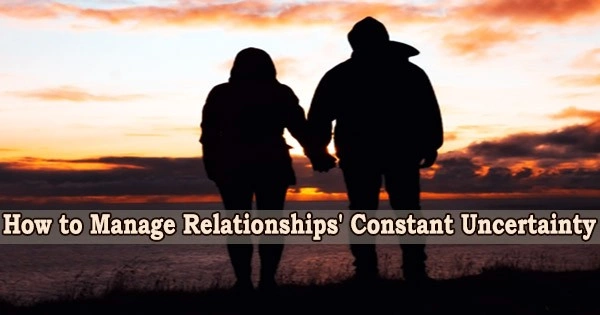Everything is unclear, aside from this particular time. You anticipate finding your car where you parked it the previous morning when you go to bed at night. Actually, you won’t know it’ll be there until the next morning when you discover it in the same spot.
The majority of individuals are unaware of all the actual uncertainties. Instead than fretting all night about whether or not your automobile will be there, you deal with it when it’s not there in the morning.
Relationships are also uncertain. You have no idea what will occur in a month, a year, or ten years. What will happen tomorrow is unknown. It might be challenging to experience the uneasiness that comes with admitting the ambiguity in your relationship.
People frequently create a variety of scenarios in order to deal with uncertainty. Most of the stories tend to be negative, painful, worst-case scenarios.
Trauma and unhealed scars from your past may make it difficult for you to accept that you are lovable and worthy of a stable, long-term relationship. You can believe you are unlovable and harbor a strong worry that you will be let down by everyone.
Whatever the reason, it hurts a lot to be in a relationship that you continually worry will fail. You might constantly be on high alert in case you are wounded, and you might spend a lot of time attempting to predict the future.
The desire to have certainty makes sense. You want to know whether you’re going to be hurt. You want to feel prepared. The issue is that, despite your best efforts, you cannot predict the future before it occurs. Thinking on the future incessantly simply serves to exacerbate the anguish of the present.
Since you can’t know what the future holds, it isn’t serving you to try to know it. You’re wasting a lot of head space and energy trying.
Instead, you might learn to live in the now and have faith that the future will bring whatever it holds, and you can deal with it then. You may interact with your partner by letting rather than controlling when you have the capacity to be present and bear the discomfort of uncertainty. Allowing means seeing where things go and how the future unfolds.
Being at peace in uncertainty doesn’t guarantee that things work out forever, but it gives the future a chance to emerge naturally. Trying to control the future eliminates the chance for things to grow.
The following tips will help you handle uncertainty in a way that feels better and helps you let go of control, so you can enjoy your life and your relationship and see where things go:
- Notice that you are struggling with uncertainty. You might realize that you’re trying to predict what will happen by overthinking, overanalyzing, or visualizing the future. You might realize that your breathing is shallow or that your body is experiencing other things. Awareness in the moment is key.
- Surrender to the fact that you don’t actually know what’s going to happen, what your partner is thinking, or what they meant by the way they looked at you the other day. Regardless of the ambiguity, you are in the dark. You won’t know no matter how much you consider it, how much you evaluate it, or how much you envision it. If you continue doing that, all that will happen is that you’ll continue to stress yourself out and remain uncertain. Instead, accept that you cannot and will not know, and that there is no purpose in trying to do so.
- Remind yourself that when you can know, you will know, and you’ll deal with whatever it is. Give yourself a pep talk and remind yourself that it’s OK not to know more than you do right now.
- Breathe. Imagine letting your worries, analysis, and fantasies fall away.
- Shift your attention to something else. Think about something interesting, do a task that requires your concentration. Contact a friend and get connected. These are all ways of getting present.
Make sure to routinely practice deep breathing to take care of your nervous system. All of that fretting and overanalyzing makes anxiety worse and causes dysregulation. You may regulate yourself and become more mindful with the use of breathing exercises and encouraging self-talk.
















